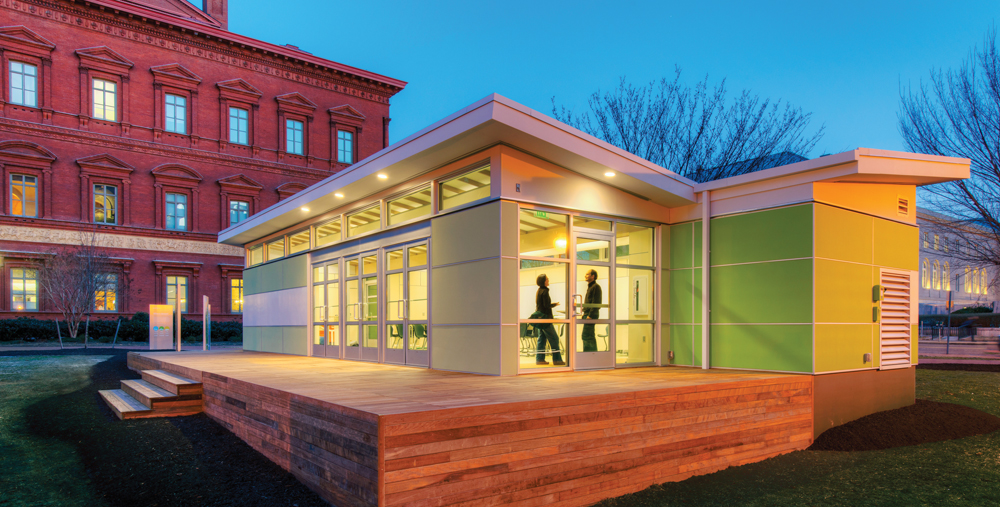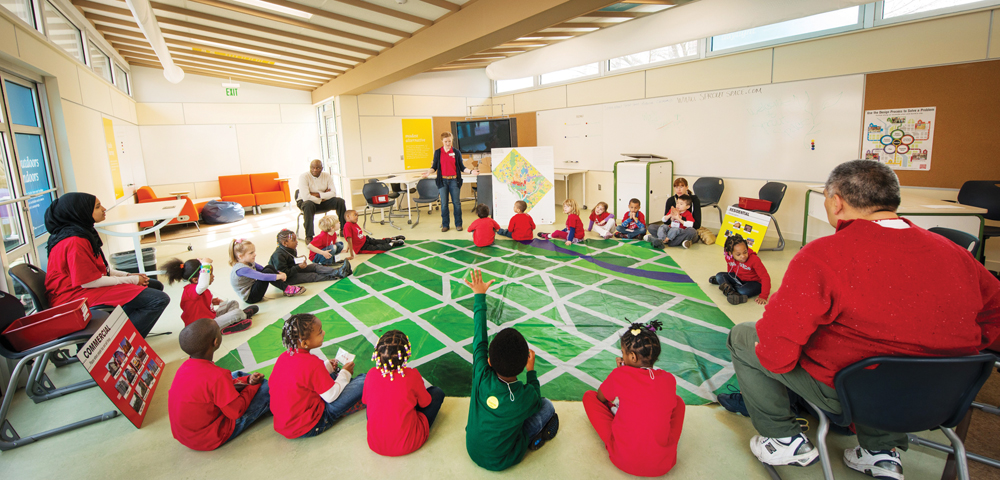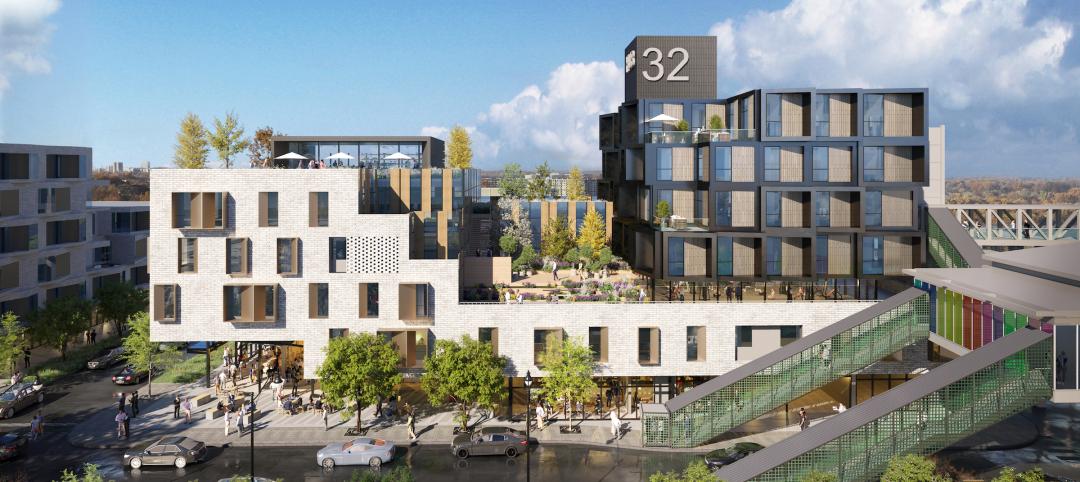While modular construction offers many benefits—notably less construction waste, project delivery efficiencies, and factory-controlled, high-quality fabrication—school districts frequently view modular as a temporary solution, and settle for units with poor design and low-quality materials. As a result, when the “temporary” modules inevitably turn into permanent structures, they fall short in terms of aesthetics and building performance.
Today, however, school districts are starting to look at higher-quality modular construction, with the understanding that the classrooms may remain on site for a number of years and must provide a proper learning environment, says Wendy Rogers, AIA, LEED AP BD+C, Design Principal with LPA Inc.
Building Teams are using incremental improvements as a strategy to create better modular solutions. For example, in a recently completed a 35,000-sf modular two-story project, LPA pushed the manufacturer to upgrade many of its standard details in order to ensure that the products met the project’s design criteria.
When executed properly, prefab construction can offer column-free interior spaces that promote flexibility and access to crawl space, open ceilings that allow for easy technology upgrades, and rainscreen building envelopes that are highly insulated and allow options and variation for exterior materials, according to Chester Bartels, Senior Designer with Baltimore design firm Hord Coplan Macht.
For example, the firm’s modular learning studios at the Barrie School in Silver Spring, Md., easily convert into large group learning spaces, multiple small group collaboration areas, and a large town hall lecture room—all supported by flexible furniture, movable wall panels, smart boards, good acoustics, and strategically designed fenestration for optimized daylighting and views.
A recent exhibition, Green Schools, at the National Building Museum in Washington, D.C., included a green classroom called “Sprout Space,” developed by Perkins+Will. (See the time-lapse video of its construction at: http://www.nbm.org/media/video/green-schools/sprout-space-time-lapse.html.) P+W’s modular template in Sprout Space offers a healthy, sustainable, and flexible 21st-century modular classroom. The design incorporates passive and active green-building strategies and is highly customizable.
For instance, Sprout Space can incorporate sunshades, integrated rainwater collection, photovoltaic roof panels, LED lighting with lighting controls, efficient heating and cooling systems, and eco-friendly materials. “Sprout Space also features a dynamic plan that is well-suited for various teaching styles, seating configurations, and outdoor learning opportunities,” says Steven Turckes, P+W’s K-12 Education Global Market Leader. “Each classroom opens up to the outdoors through large bifold doors, encouraging experiential learning, expanding the classroom, and complementing numerous teaching methods.”
Because fabrication occurs simultaneously with foundation and site work, high-quality modular classrooms can be completed four times faster than conventional stick-built projects, says Turckes. Available in modules up to 1,500 sf in size, multiple buildings can also be linked together to create an entire school.
Another customizable modular template, called simply “sky,” comes from contractor Silver Creek Industries (silver-creek.net). This high-performance modular classroom, which has been approved by the California Division of the State Architect, offers two contemporary floor plans and a variety of interior and exterior finish options—low- and no-VOC finishes, paints, and adhesives, sound-absorbent surfaces, high-performance windows, clerestory windows, tubular skylights, and an occupancy- and photo-control dimming system.
Ryan McIntosh, LEED AP BD+C, Project Manager and Director of Design Services for Silver Creek, says that sky modules beat California’s Title 24 baseline by up to 45%. The module has been developed to meet the CHPS PreFAB rating system, a label that designates qualifying prefabricated classrooms for use in high-performance building projects. Schools and districts can apply the CHPS PreFAB rating toward CHPS Verified recognition for new classrooms.
Related Stories
Building Team | Mar 8, 2023
Call for Speakers: BD+C’s 2023 Women in Residential + Commercial Construction Conference
The 2023 Women in Residential + Commercial Construction conference event will take place October 25-27 in Nashville, Tenn., and will bring together more than 300 women leaders from all facets of the $1.4 trillion U.S. residential and commercial constructing sector.
Reconstruction & Renovation | Mar 8, 2023
Hoffmann Architects + Engineers receives Lucy G. Moses Preservation Award from New York Landmarks Conservancy
Hoffmann Architects + Engineers, a design firm specializing in the rehabilitation of building exteriors, announces that the historic facade rehabilitation and window replacement at the 69th Regiment Armory has been selected for the Lucy G. Moses Preservation Award, the New York Landmarks Conservancy’s prestigious recognition for outstanding preservation efforts.
Architects | Mar 7, 2023
David Chipperfield named 2023 Pritzker Architecture Prize laureate
Widely regarded as architecture's highest honor, the 2023 Pritzker Architecture Prize has been awarded to UK-based architect David Chipperfield. In honoring Chipperfield with the award, the Pritzker Prize jury cited the architect's "commitment to an architecture of understated but transformative civic presence and the definition—even through private commissions—of the public realm."
Multifamily Housing | Mar 7, 2023
Multifamily housing development in Chicago takes design inspiration from patchwork and quilting
HUB 32, a 65-unit multifamily housing development, will provide affordable housing and community amenities in Chicago’s Garfield Park neighborhood. Brooks + Scarpa’s recently unveiled design takes inspiration from the American tradition of patchwork and quilting.
Industrial Facilities | Mar 6, 2023
The largest planned logistics and business park in North America gets under way in Southern California
The $25 billion World Logistics Center will boost the supply chain capabilities of Southern California and will serve as a distribution center for destinations across the continent.
Healthcare Facilities | Mar 6, 2023
NBBJ kicks off new design podcast with discussion on behavioral health facilities
During the second week of November, the architecture firm NBBJ launched a podcast series called Uplift, that focuses on the transformative power of design. Its first 30-minute episode homed in on designing for behavioral healthcare facilities, a hot topic given the increasing number of new construction and renovation projects in this subsector.
K-12 Schools | Mar 6, 2023
Benefitting kids through human-centric high school design
Ingrid Krueger, AIA, LEED AP, shares why empathetic, well-designed spaces are critical in high schools.
Adaptive Reuse | Mar 5, 2023
Pittsburgh offers funds for office-to-residential conversions
The City of Pittsburgh’s redevelopment agency is accepting applications for funding from developers on projects to convert office buildings into affordable housing. The city’s goals are to improve downtown vitality, make better use of underutilized and vacant commercial office space, and alleviate a housing shortage.
Student Housing | Mar 5, 2023
Calif. governor Gavin Newsom seeks to reform environmental law used to block student housing
California Gov. Gavin Newsom wants to reform a landmark state environmental law that he says was weaponized by wealthy homeowners to block badly needed housing for students at the University of California, Berkeley.
Green Renovation | Mar 5, 2023
Dept. of Energy offers $22 million for energy efficiency and building electrification upgrades
The Buildings Upgrade Prize (Buildings UP) sponsored by the U.S. Department of Energy is offering more than $22 million in cash prizes and technical assistance to teams across America. Prize recipients will be selected based on their ideas to accelerate widespread, equitable energy efficiency and building electrification upgrades.


















